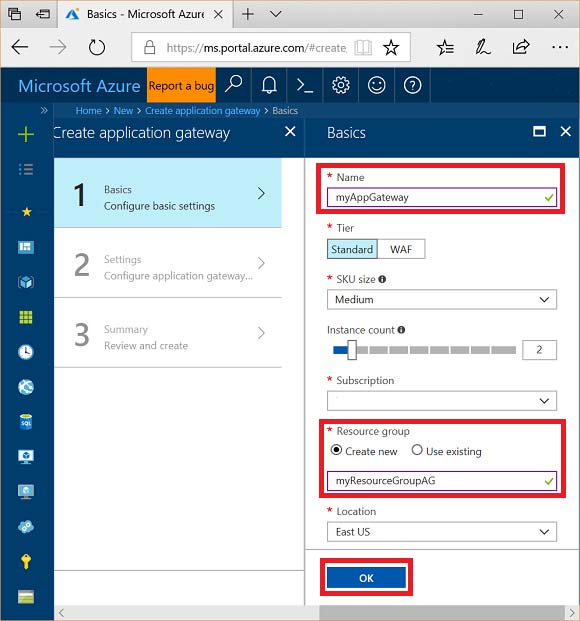Deploying Application Gateway for High Availability and Load Balancing
Question
SIMULATION -
This is a lab or performance-based testing (PBT) section.
The following section of the exam is a lab. In this section, you will perform a set of tasks in a live environment. While most functionality will be available to you as it would be in a live environment, some functionality (e.g., copy and paste, ability to navigate to external websites) will not be possible by design.
Scoring is based on the outcome of performing the tasks stated in the lab. In other words, it doesn't matter how you accomplish the task, if you successfully perform it, you will earn credit for that task.
Labs are not timed separately, and this exam may have more than one lab that you must complete. You can use as much time as you would like to complete each lab. But, you should manage your time appropriately to ensure that you are able to complete the lab(s) and all other sections of the exam in the time provided.
Please, note that once you submit your work by clicking the Next button within a lab, you will NOT be able to return to the lab.
To start the lab -
You may start lab by clicking the Next button
Tasks -
Click to expand each objective -
To connect to the Azure portal, type https:/portal.azure.com in the browser address bar.
You need to deploy an application gateway named appgw1015 to meet the following requirements:
Load balance internal IP traffic to the Azure virtual machines connected to subnet0. Provide a Service Level Agreement (SLA) of 99.99 percent availability for the
Azure virtual machines.
What should you from the Azure portal?
Explanations
See explanation below.
Step 1:
Click New found on the upper left-hand corner of the Azure portal.
Step 2:
Select Networking and then select Application Gateway in the Featured list.
Step 3:
Enter these values for the application gateway:
appgw1015 - for the name of the application gateway.
SKU Size: Standard_V2 -
The new SKU [Standard_V2] offers autoscaling and other critical performance enhancements.

Step 4:
Accept the default values for the other settings and then click OK.
Step 5:
Click Choose a virtual network, and select subnet0.
https://docs.microsoft.com/en-us/azure/application-gateway/application-gateway-create-gateway-portalThis is a simulation-based question from the Microsoft Azure Integration and Security exam. You will be required to perform tasks in a live environment and complete a lab to deploy an application gateway named appgw1015 that can load balance internal IP traffic to the Azure virtual machines connected to subnet0 and provide a Service Level Agreement (SLA) of 99.99 percent availability for the Azure virtual machines.
To start the lab, you need to click on the Next button, which will take you to the Azure portal. Once you are in the Azure portal, you need to follow the steps below to deploy the application gateway:
Click on the + Create a resource button on the left side of the Azure portal.
In the search bar, type in "Application Gateway" and select "Application Gateway" from the dropdown.
Click on the Create button on the Application Gateway page.
On the Create application gateway page, you need to provide the following information:
- Subscription: Select the subscription you want to use for the application gateway.
- Resource group: Choose an existing resource group or create a new one.
- Name: Enter "appgw1015" as the name for the application gateway.
- Region: Choose the region where you want to deploy the application gateway.
- SKU: Choose the SKU you want to use for the application gateway.
- Virtual network: Select the virtual network where your virtual machines are connected.
- Subnet: Select the subnet where your virtual machines are connected.
- Frontend IP address type: Choose the type of IP address you want to use for the application gateway.
- Frontend IP address name: Enter a name for the frontend IP address.
- Backend pool name: Enter a name for the backend pool.
- Virtual machine IP addresses: Enter the IP addresses of the virtual machines that you want to load balance.
Click on the Next: Frontends button.
On the Frontends page, you need to provide the following information:
- Frontend IP configuration: Choose the frontend IP configuration you want to use.
- HTTP/HTTPS settings: Choose the HTTP/HTTPS settings you want to use.
Click on the Next: Configuration button.
On the Configuration page, you need to provide the following information:
- SKU: Choose the SKU you want to use for the application gateway.
- HTTP/HTTPS settings: Choose the HTTP/HTTPS settings you want to use.
Click on the Next: Tags button.
On the Tags page, you can add tags to the application gateway if you want.
Click on the Review + create button.
On the Review + create page, review your settings and click on the Create button to deploy the application gateway.
Once the deployment is complete, you will have an application gateway named appgw1015 that can load balance internal IP traffic to the Azure virtual machines connected to subnet0 and provide a Service Level Agreement (SLA) of 99.99 percent availability for the Azure virtual machines.